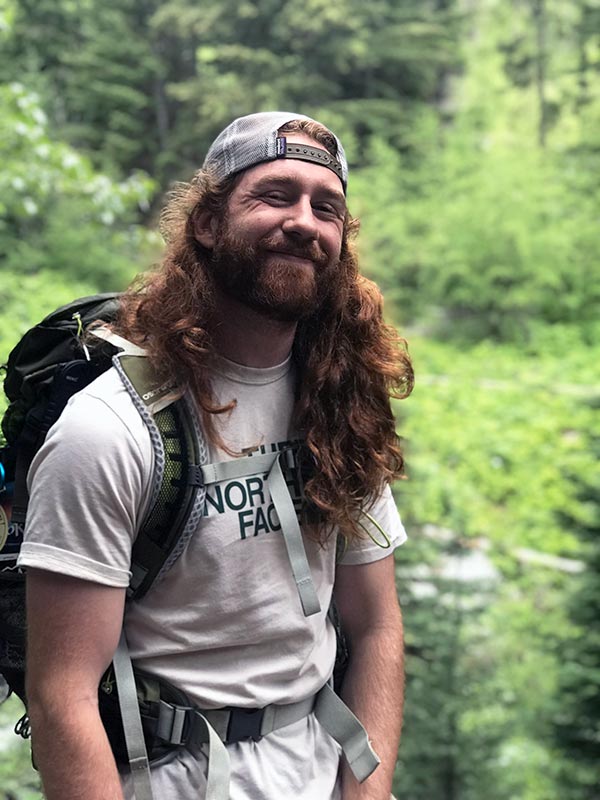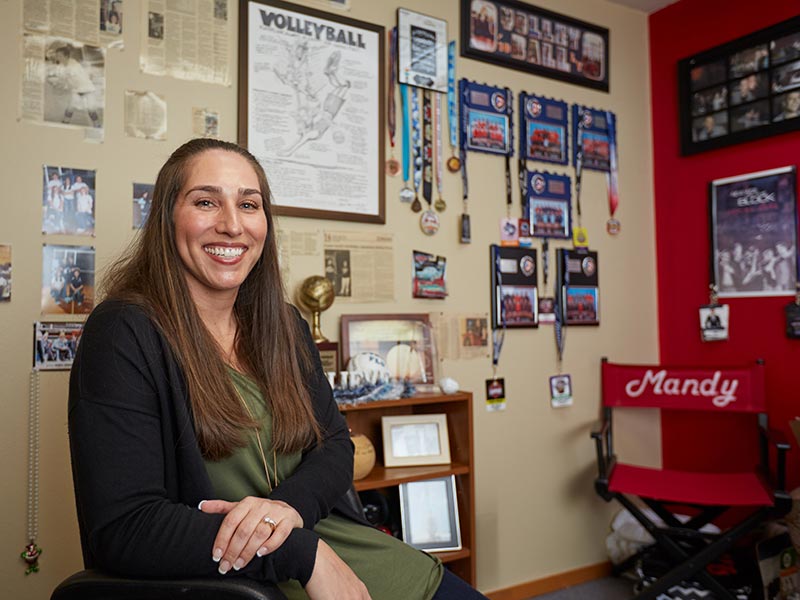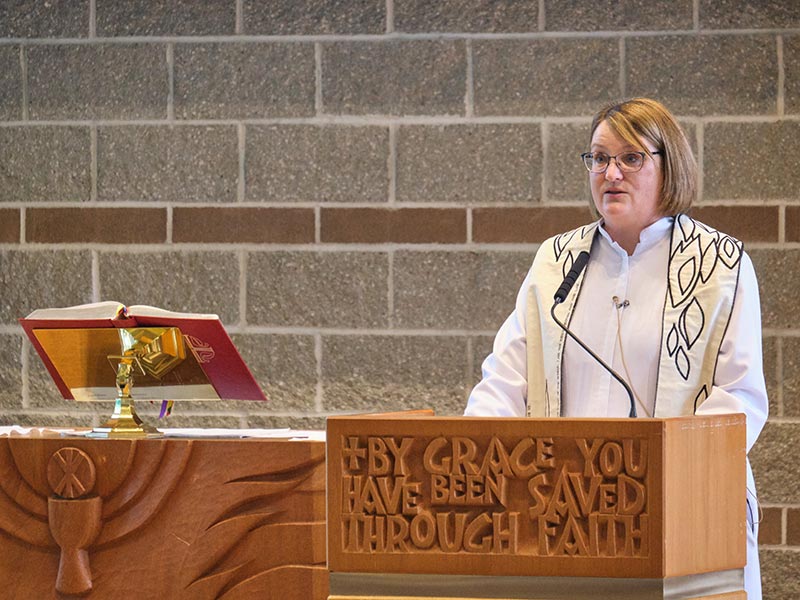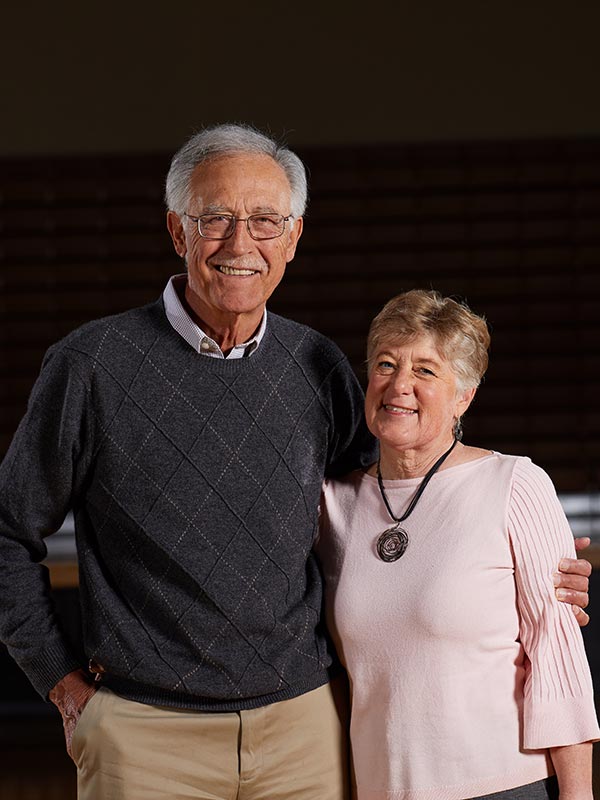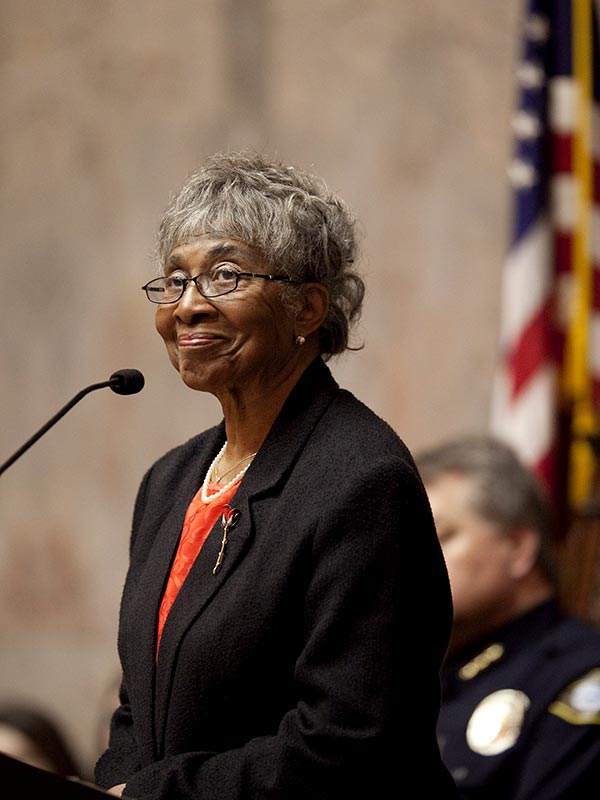
Here’s how Lutes in different life stages define it
Finding Lutes who have achieved great things isn’t hard, in just about any endeavor you choose. Getting them to brag about it can be a little trickier. Modesty plays a part, to be sure. But PLU compels community members to think broadly and deeply about what success might mean throughout their lives. We talked to Lutes in various stages of life about how they see success.
Here are their thoughts.
Dream it, do it
I would love to help at least 53 million Kenyans to college by the time I die.
Moses Mbugua '20
“Success is being able to have a dream,” says Moses Mbugua ’20, “and being able to actually accomplish it.”
Mbugua grew up in Kent and Federal Way, WA where his family has lived since 2003. But the Nairobi-born Lute keeps Kenya on his mind. And close at hand — he wears a bracelet with the colors of the Kenyan flag on his right wrist.
Kenyans, he says, tend to be relentlessly entrepreneurial. His own ambitions are fueled by a desire to inspire others. This reflects the philosophy of Lutheran higher education and its insistence that human beings are not called upon to escape this world, but rather to engage it.
Mbugua envisions a company reaching millions of students, in the US and internationally.
“I would love to help at least 53 million Kenyans to college by the time I die,” he says casually.
If you want to realize big dreams, you can’t get distracted. Fortunately, Mbugua already, literally, has built an app for that. With Procrasti Mate, students can temporarily lock their smartphones for a set period of time. Unlocking the phone requires answering a trivia or flashcard challenge.
The goal, he says, is to make users “more aware of how often they pull the phone out of their pockets,” while allowing them to create study opportunities.
The team behind the app includes current and former students Adam Baldwin ‘18, Colton Walter ‘19, and Nick Sundvall ‘20, and local developer and educator Peter Gruenbaum. Engineer and entrepreneur Al Herron has also been a mentor.
At PLU, Mbugua appreciates the academic rigor and close relationships with professors. He found a sense of community with the debate team and he appreciates the breadth of his education, beyond his computer science major. He knows that being a better writer, for example, will help communicate his ideas in business.
Originally, he wanted to be a doctor — “the definition of a solid job,” he says. It took some effort to convince his mom that he could build a company and still be a success. Now his parents, who gave him his love of learning and education, are proud.
“I’m very persistent when I want something,” he says. “That’s just how I am.”
Excel, experience
I now see myself as someone who can teach others, be a role model, and be confident.
Isaiah Scheel '19
“In high school,” says Isaiah Scheel ’19, “success was numerically measured in everything.” Grades, sports, extracurriculars — he excelled in all these areas at DeSales Catholic High in Walla Walla, WA, where he was a member of the football and track-and-field teams, and graduated as salutatorian.
At PLU, however, he discovered additional measures of success.
“I have found that I value my experiences, especially outdoor ones, the most,” says the recent trip leader and director for PLU Outdoor Recreation.
Not that he’s done poorly by more traditional measures. A computer science major minoring in mathematics and physics, Scheel graduated magna cum laude.
“I am proud that I was able to excel in both school and sports,” he says. “But the success that I am most proud of is my growth as a leader.” He’s been a trip leader and director with Outdoor Recreation, part of the admissions team, a sprinter on the men’s track and field team, and a resident assistant at two different residence halls, among other things.
“I now see myself as someone who can teach others, be a role model, and be confident,” he says of his leadership experience. “It has given me courage and has made me be able to connect to people in a way that brings joy into my life.”
Scheel cites two friends at PLU who most influenced his idea of success. “Tom Pfeifle ‘19 taught me that no matter how busy or stressed you may be, there is always time to spend with friends and nature,” he says. “Tom unfortunately passed away due to a climbing incident, so lessons I have taken from his life have meant a lot.”
The second, Brad Hodkinson ‘19, is a fellow student-athlete and outdoor enthusiast.
“Brad taught me to always make time for fun and that making goals is a key to success,” Scheel says.
“My ideas for success in high school were definitely money and job oriented,” he acknowledges. “I saw a successful life as one with a lot of money and a traditionally respected job. As I finish my time at PLU, the one thing that I really want in life is to be able to focus on things that make me happy.”
Explore
Finding your calling and your purpose in life is an ongoing process. I already know I’m a teacher, so I try to add to that.
(Photo by Tacoma Public Schools)
Danay Jones '15
“My life goal,” says Danay Jones ’15, “is to travel on all seven continents. I have three left!”
She hopes to do this through teaching. As a first-generation college student, she had the opportunity through the Wang Center to work as a student teacher in Namibia and visit Hungary, and as a high school student at Henry Foss in Tacoma, she spent two weeks in Japan.
“PLU helped spark more of my love for travel,” she says, “seeing the beauty of the world, seeing more cultures and meeting more people.” She earned her bachelor’s in elementary education at PLU, a master’s from Walden University, and has worked for four years at Arlington Elementary in Tacoma.
Her idea of success is tied to vocation — which means more than choosing a career, according to PLU’s Wild Hope Center for Vocation.
“Finding your calling and your purpose in life,” she says, is an ongoing process. “I already know I’m a teacher, so I try to add to that.”
Currently, she serves on the board of Peace Community Center, an organization that helped her in high school, connected her to the Act Six program and PLU, and gave her experience as a summer counselor and teacher.
Staying connected to community and family is important to Jones.
“Including others around you,” she says, is “another part of success.” At PLU, there were “a lot of people who have been great pillars in my life, mentors I can still reach out to, and ask questions,” she says.
She rattles off names — Eva Frey, Lace Smith, Angie Hambrick, Nicole Juliano, Hannah Middlebrook, Melannie Denise Cunningham.
“I knew Ms. Cunningham coming in from high school,” she says. “She’s just been there every step of the way.”
Jones has found these pillars outside PLU, too, mentioning “my mom, my church, Ms. Denice Randle.”
Now, as a teacher, she is taking on that role, working to give students a foundation to build their dreams on.
“Teaching helps you put others first,” she adds. “Teaching is kind of humbling in that way. People need to be humbled, which comes with success.”
“Success is not cookie cutter,” says. “Everybody reaches quote-unquote ‘success’ in different times in their lives, so it’s a journey.
Don’t compare yourself to others — just trust the journey.”
“As clichéd as that sounds,” she laughs, “that’s really real.”
Learn from defeat
Sports taught me how to get back up when life knocks you down.
Mandy Flores-Handley '00
“Sports taught me how to deal with failure,” says Mandy Flores-Handley ’00, “how to get back up, learn from it and move forward. And that is part of success as well.”
A 2015 inductee into the PLU Hall of Fame, Flores-Handley starred on conference championship teams in volleyball and softball, collecting school records and accolades along the way. She was a NAIA second-team All-American in 1998, and PLU’s 2000 Athlete of the Year.
Of all her accomplishments, Flores-Handley is proudest of graduating in four years, as a two-sport athlete. “I’m not very good about talking about myself,” she admits, but she’s eager to credit her coaches — Kevin Aoki and Tim Templin for volleyball, and Rick and Leanne Noren and Phil Scott for softball. “They taught me discipline, accountability, how to be a good teammate, to expect my best from myself and to push myself even when I didn’t think I could,” she says.
Following in their footsteps, Flores-Handley coached for two decades, at Rogers High School in Puyallup, WA and elsewhere, including five years as an assistant PLU softball coach. She won a national championship with Lake Tapps Volleyball Club in 2015, and was named 2006 South Puget Sound League Coach of the Year and All-Area Coach of the Year by The News Tribune of Tacoma.
Her teachers at PLU included the legendary Frosty Westering, whose book, “Make the Big Time Where You Are,” she recalls fondly. “He was an inspiration for so many people,” she says. “Even years later he remembered who I was, and that just spoke volumes to me.”
Another influential professor was Colleen Hacker. “Dr. Hacker was tough and demanded a lot,” she says, but saw things in her that she didn’t yet see in herself. “I learned a lot in the class and actually use it in my full-time job today.” A vocational rehabilitation counselor, Flores-Handley has worked 19 years for the same employer that gave her a college internship.
Now retired from coaching, Flores-Handley and her husband travel as much as they can. She’ll also celebrate a milestone this July — 10 years as a cancer survivor. “Success is different for everyone,” she explains, so she advises students to live full lives and to find and follow their own vocation.
Follow your own path
Without the willingness to try new things, and potentially fail and learn from the failure, our ‘success’ is limited or shallow.
Alicia Lawver '98
“Once upon a time, I thought success was about checking the boxes,” says Alicia Lawver ’98. “Get good grades. Go to a good college. Get a good job and work hard. Get married around 30. Buy a house. Have kids before 40. The sum will be success.”
“Then life happened,” she explains. “I got married at 22 to the funny fellow I met at the PLU involvement fair my freshman year, we had three kids before turning 30, I realized that newspaper night-desk work wasn’t very kid-friendly, and I threw the cards in the air.”
At PLU, she’d been inspired by her professors in the communications department, including Cliff Rowe and Diane Harney, as well as Joanne Lisosky — whose first classroom presentation she remembers to this day. After graduation, she worked as a journalist and writer, until the time came for her to seek a new path.
She took a job with the City of Tacoma, part of an effort to expand community gardens. Her current work with Tacoma Public Schools involves connecting policies to action, including implementing the district’s commitment to investing bond dollars inclusively in the community.
“The fact that we are now seeing measurable progress and palpable successes has me head-over-heels in love with this path I never thought I’d be on,” she says.
What connects all these endeavors, she says, is a lifelong “penchant for questioning things.” “I am probably proudest of raising kids who challenge the way I think and challenge my definition of success,” she says. “They amaze me every day.”
Any advice for today’s Lutes? “Without the willingness to try new things, and potentially fail and learn from the failure, our ‘success’ is limited or shallow,” she says.
Nathe Lawver '98
The “funny fellow” Alicia Lawver met in her first year, Nathe Lawver ’98, shares his wife’s respect for failure’s lessons.
“For the longest time, I thought that success was a destination, a place at which you eventually arrived after hard work, determination and a few setbacks,” he says. “I was wrong. The journey is just as much a part of success as the completed product. Each failure, each setback, each stumbling block is a key component to learning and achieving that success. And if you don’t succeed, as long as you’ve learned something that makes you a better human in the process, you’ve succeeded.”
Upon arriving at PLU, he embraced an open-minded approach to life’s possibilities — perhaps to an extreme. “In the first semester, and Alicia can back this up, I changed my major (in my head at least) 10, maybe 15 times,” he laughs. “The world was full of amazing opportunities and I wanted to learn it all.”
Then, on a class trip to Seattle, he had a transformative conversation with Beth Kraig, history department chair, who would become his mentor.
“Well, Nathe,” she told him, “you should consider being a history major. You get to write, you get to think critically and you have some opportunities to make an impact.”
She convinced him, and he went on to use those skills in his career as a labor leader and on nonprofit boards. “Success is not an individualistic pursuit. Everyone relies on a team,” he says, “whether it’s having a conversation with a mentor, or helping someone else to be better.”
“All successes started with some sort of failure and getting back up when you’re knocked down,” he’s come to see. “Then, if you’ve gotten up enough, you can help other people get up. That, too, is success.”
Serve
What is a well-lived life?
Rebecca Shjerven '84
To the Rev. Rebecca Shjerven ‘84 of Tacoma’s St. Mark’s Lutheran Church By the Narrows, “success” might be too narrow a concept. Instead, she asks, “What is a well-lived life?”
“In my line of work,” she explains, “maybe that looks like where your daily life reflects what God has created you to be.”
And how do you figure that out? “By figuring out who you weren’t created to be,” she says.
As a young girl, Shjerven jokes, she wanted to be Mary Tyler Moore. Maybe that wasn’t it. But growing up in a parsonage, she knew she wanted to live a life of service.
“From an early age, I wanted to be a teacher,” she says. At PLU, she appreciated the practical experience that education students received at area schools. “Everything was action-reflection,” she says. “It wasn’t just theories about education, but getting you out there, and seeing if this was a fit.”
Along the way, Shjerven took an interest in deaf education, and a professor encouraged her to focus in the area. This meant transferring to a sister school, Augustana in Sioux Falls, SD, where she finished with a major PLU didn’t have. “It was really an unselfish act,” says Shjerven. “I experienced a lot of that from my professors and mentors at PLU.”
Another influence was Susan Briehl, a former PLU campus pastor and the first female pastor she’d encountered , who told her to consider seminary. This planted a seed that took years to grow. “What a gift that was,” Shjerven says, calling PLU “a community that helps people to imagine.”
After graduation, she found herself in early ’80s Seattle. “It was the height of yuppiedom,” she says. “Success was measured by what kinds of toys you had, and how much you were making.” But Shjerven had a strong foundation, which she attributes both to her family and to a Lutheran higher education.
Eventually, after working as a teacher, she became a parish pastor — now for 26 years and counting — and a wife, stepmother and mother. “I’ve been able to have a seamless cloth between my work life, family life, and my faith,” she says.
Make it better
Life intervenes in ways that can thwart any aspiration, through no fault of your own.
Art Thiel '75
“I’m not someone who likes to measure success by counting things — how many times I’ve done something, or how much money I’ve made,” says Art Thiel ’75. These days, he says, “I don’t find things like money, prestige or social media likes personally rewarding.”
A legendary sportswriter and commentator for the Seattle Post-Intelligencer, KNKX, and other outlets, Thiel has written or co-written three books, and is co-founder of SportspressNW.com. His publications, career and the friends he’s made along the way are rewarding in themselves, he says, but he doesn’t think of them in terms of success or failure.
“I have a different view of success than some people may have,” he says. “I define success as making something better. That could be a sentence in a story, weeding a garden, or teaching a young person good grammar.” He chuckles. A patient craftsperson can use a sense of humor.
A sense of perspective helps, too. Maybe that’s why Thiel’s career has outlasted several of the newspapers that published him. Making things better is a way of focusing on what can be done, here and now.
“Life intervenes in ways that can thwart any aspiration, through no fault of your own,” he says.
As an undergraduate, Thiel didn’t have any grand plans. “I just knew I really enjoyed the English language, and how journalism let me deploy it,” he says.
His course of study allowed him the freedom to take lots of electives, in areas he knew nothing about. To be a good journalist, he explains, “you have to know a little bit of everything.”
While in school, he found time to work at a Tacoma newspaper, so he advises students to use PLU connections to tap into community resources. He also encourages them to experience other cultures, an opportunity he’s found through travel. “I covered nine Olympics,” he says. “It’s altogether remarkable what different societies value as markers of success.”
Stay rooted
Success comes from being committed to something — a mission, purpose, and building a community that shares vision and value.
Jim Van Beek '59, '69 and Ingrid Van Beek '70
It’s hard to imagine a life more deeply tied to PLU than that of Jim Van Beek ‘59, ‘69, a Hall of Famer on the legendary basketball teams of the late 1950s. During his sports career, the Lutes won 37 straight games against Evergreen Conference rivals and represented District I at the NAIA national tournament four straight years. Van Beek averaged a career-best 16.8 points per game as a senior and in the 1959 championship game against Tennessee State, Van Beek led the Lutes with a team-high 24 points.
Van Beek also worked at the university for 50 years, serving as dean of admissions and financial aid, and ending his career in development. “I still feel like I’m working for PLU,” he says. “It’s part of who I am.”
His connection took root early. At elementary school in Parkland, and as a member of the first graduating class of Franklin Pierce High School, he was surrounded by friends whose parents worked at PLU. His teachers were alumni, as was his coach, Del Shafer. He had other offers, but becoming a Lute was “a natural thing for me,” he says.
Ingrid Van Beek ’70, Jim’s wife, has deep PLU roots as well. Her father, Victor Knutzen, was on the Board of Regents, and Chris Knutzen Hall is named for a great-uncle. Her mentors encouraged her to go to graduate school, and she came back to PLU to teach math, working part time for 13 years while raising kids.
Like Jim, who briefly taught at Franklin Pierce after graduation, she’d always considered teaching, though she’d been raised to assume working outside the home was a fallback option for women. Instead, she had a long teaching career, with stops at Fife High School and Highline Community College, and another long career as a financial advisor — “teaching one-on-one, instead of a class,” as she puts it.
“I didn’t set out with a career goal, but I had more than enough opportunities to find balance between raising a family and feeling good about my accomplishments,” she says.
The idea that success and happiness always comes from a career doesn’t ring true for Ingrid. “Ultimately peace and fulfillment and happiness comes from satisfaction and relationships,” she says. “Jim found that at PLU.”
Over the years, Jim saw the importance of providing access and financial aid to students and reveled in how those students made PLU a better place. His greatest legacy is in the lives of the students and staff he brought to PLU. To this day, the couple hears stories from people who say they’d never have become Lutes if it weren’t for Jim.
“Success comes from being committed to something — a mission, purpose, and building a community that shares vision and values,” Ingrid says. Jim is proud of passing on his values to his family. Three of four children and three of seven grandchildren went to PLU, including twin granddaughters who went on to the Peace Corps. “I always loved the mission — education for a life of service,” he says.
And it was PLU that brought the couple together, late in life. At the retirement gala for President Loren Anderson, they both sat at a table where Jim served as host. They knew of each other, but weren’t aware that they were both single at the time.
Shared PLU ties and a strong faith brought them together, but the clincher? “We both love golf,” Ingrid says. “He asked me to play golf.”
“She beat me,” Jim adds, happily. “I definitely feel blessed with this lady.”
“It’s another good chapter for us,” she says.
Lift as you climb
Sometimes people say to me, ‘When do you sleep?’ I say, you have to keep your eyes open to see what’s going on, and you have to be in the room where the decisions are being made.
Rosa Franklin '74
A daughter of the segregated South who became a world traveler. A young cadet nurse who thrived in a changing profession for four decades, earning multiple degrees and membership in the Washington State Nurses’ Association Hall of Fame.
A military wife and mother of three, who found time for her own career while maintaining a 70-year marriage. A pillar of the Washington legislature for 20 years, serving twice as President Pro Tempore of the Senate.
If you want to ask Rosa Franklin ’74 the secret to a successful life, you might have to figure out which of her many lives you are talking about.
“Sometimes people say to me, ‘When do you sleep?’ ” she says. “I say, you have to keep your eyes open to see what’s going on, and you have to be in the room where the decisions are being made.”
So, maybe she doesn’t? “You can’t be sleeping, because while you are sleeping, other people are making the decisions,” she adds.
Of all her accomplishments, she’s proudest of her family. Her three grandchildren, she says, want to carry on her values — “to really follow in my footsteps of doing things to make the world a bit better.”
A strong extended family was important to Franklin’s own upbringing. Born in tiny Moncks Corner, SC, she went to live with an aunt and uncle at age 7, returning to her parents in the summers. Her family prized learning and faith, carrying on a tradition among descendants of enslaved people who saw education as a path to self-sufficiency and mutual support.
Franklin always expected to go to college — and to travel. When ships from around the world came to the segregated port city of Georgetown, SC, sailors of color needed places to eat and sleep. “Neighbors always said they knew when the ships came in because of our house,” Franklin says, “because of the music.”
The dreams of her cosmopolitan upbringing were realized in Germany, where her husband served two stints with the army. She camped on the Riviera, visited museums and bicycled around Europe, traveling with other spouses when her husband couldn’t join her. She was in Munich when John F. Kennedy spoke at the Berlin Wall, and found herself welcomed at hotels while segregationists back home were setting dogs on protesters.
Returning to Tacoma, she pursued further education at night while working and raising children, earning a degree from PLU in social science and human relations. Eventually, her commitment to community led to the Washington State Legislature, where she became the first African American woman senator.
Success wasn’t something Franklin had time to think about. “It was just getting it done,” she says. Looking back now, she has wisdom to spare. “To be successful, you must be diligent, set a goal, develop trust, build relationships, and have humility, because it’s not about you!” she says. “Be able to compromise, but don’t compromise your principles.”
Young people, she advises, should stay vigilant, as old social problems tend to reappear, and never forget the past.
“No one is self-made — someone helped you on the way to your success,” she says, recalling a motto made famous by African American women activists before she was born: “Lifting as we climb.”
“I always try to reach back and lift someone up,” she says.


